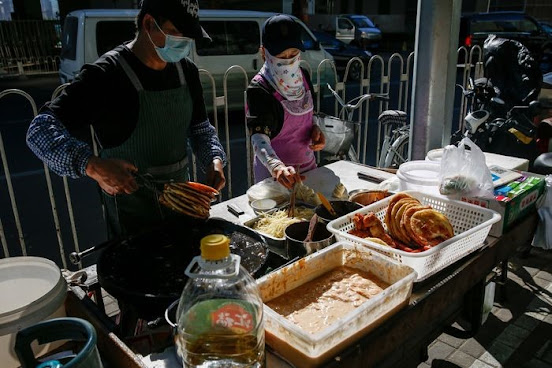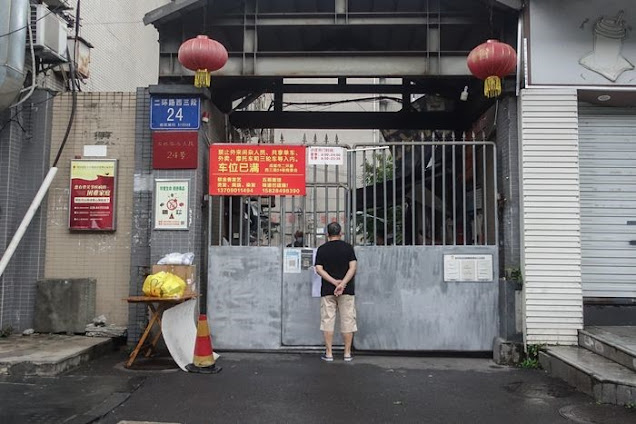Exports, the Engine of China’s Slowing Economy, Are Sputtering
The weakness in August shows impact of rising inflation and slowing global growth Extends
By Stella Yifan Xie
 The Chinese megacity of Chengdu looked like a ghost town after authorities ordered its 21 million residents to stay home to halt the spread of Covid-19. City officials said on Sunday that mass testing would be extended. Photo: CNS via Associated Press
The Chinese megacity of Chengdu looked like a ghost town after authorities ordered its 21 million residents to stay home to halt the spread of Covid-19. City officials said on Sunday that mass testing would be extended. Photo: CNS via Associated PressHONG KONG—The export boom that has powered China’s economy through the pandemic decelerated in August, reflecting the impact from rising inflation and slowing growth elsewhere in the world.
The slowdown in exports threatens to erode the pillar that has held up growth in the world’s second-largest economy, as fresh Covid-19 lockdowns in major Chinese cities are further restraining spending and the world economy edges closer to recession.
China has been struggling to shake off the effects of its zero-tolerance Covid policies and a downturn in the property market.
Last month, Chinese goods shipments to the rest of the world rose by 7.1% from a year ago to $314.9 billion, the weakest gain since April, China’s General Administration of Customs said on Wednesday.
The result fell below a median forecast of 12.5% among economists polled by The Wall Street Journal, and decelerated from July’s 18% year-over-year gain.
Slowing exports partly reflect disruptions in factory production due to temporary power shortages as a severe drought and heat wave swept through central China last month, though economists expect the impact of that to be short-lived.
Recent flare-ups of Covid-19 cases, however, threaten to disrupt manufacturing in more cities as authorities stepped up restrictions ahead of a Communist Party gathering in October, when Chinese leader Xi Jinping is expected to break with recent precedent and claim a third term.
 Beijing’s overall trade surplus edged down to $79.39 billion in August from a record $101.26 billion in July. / PHOTO: MARK R CRISTINO/SHUTTERSTOCK
Beijing’s overall trade surplus edged down to $79.39 billion in August from a record $101.26 billion in July. / PHOTO: MARK R CRISTINO/SHUTTERSTOCKOther economies in the region are showing signs of weakening exports.
On Wednesday, Taiwan reported that export growth slowed to the lowest level in more than two years, dropping to 2% in August year-over-year from 14.2% in July.
The slowdown was led by a 9.9% fall in exports to China, signaling feeble demand.
South Korea’s exports to China have dropped for three consecutive months, and were down 5.4% in August from a year earlier, contributing to record high trade deficit of $9.47 billion.
South Korea’s semiconductor exports contracted in August for the first time since April 2020 due to weak consumer demand among other factors.
A host of weakening export data in major Asia economies came as the world business activity dipped into contraction for the first time in more than two years, pointing to shrinking global demand amid economic fallout from the Ukraine war and interest rate hikes by central banks to battle inflation.
 Recent Covid-19 outbreaks in cities such as Chengdu threaten to disrupt manufacturing in more areas as authorities step up restrictions. / PHOTO: STRINGER/SHUTTERSTOCK
Recent Covid-19 outbreaks in cities such as Chengdu threaten to disrupt manufacturing in more areas as authorities step up restrictions. / PHOTO: STRINGER/SHUTTERSTOCKGlobal economic output contracted in August for the first time since June 2020, according to the purchasing managers index survey compiled by S&P Global.
The headline PMI, which measures output for both manufacturing and services sectors, fell to 49.3 last month, down from 50.8 in July and below the 50 mark that separates expansion from contraction.
If lockdown months are excluded, the latest reading was the lowest since June 2009 when the world was ensnared by the global financial crisis, noted S&P Global.
Already, shipments to some of China’s largest trading partners have pulled back.
Exports to the European Union grew by 11.1% in August from a year ago, down from a 23.1% gain in July.
Shipments to the U.S. contracted by 3.8% in August, reversing from an 11% increase the previous month, data from Chinese customers on Wednesday showed.
 As of Tuesday, 49 Chinese cities were under lockdown or various degrees of Covid control measures. / PHOTO: STRINGER/SHUTTERSTOCK
As of Tuesday, 49 Chinese cities were under lockdown or various degrees of Covid control measures. / PHOTO: STRINGER/SHUTTERSTOCKMany economists have predicted for months that China’s export boom would taper off as consumers in the West cut back on spending on goods amid the highest inflation in decades.
Surging energy costs in Europe, in large part due to Russia’s drastic cutback in its gas supplies, will likely prompt more households to save more to pay for gas bills this winter, further diminishing their demand for Chinese exports in the coming months, said Iris Pang, chief economist for Greater China at ING.
“We are not that optimistic about global demand in 2023, when the impact from interest rate hikes on the real economy will become more obvious,” said Ms. Pang.
Meanwhile, Beijing’s overall trade surplus narrowed for the first time since February, edging down to $79.39 billion in August, compared with a record $101.26 billion in July.
But economists warn the relatively robust trade-surplus data reflects continuing weak demand in China’s economy, weighed down by its strict Covid containment strategy and prolonged property-market downturn.
China’s imports weakened further in August, pointing to disappointing demand at home, as consumer confidence remains feeble while the jobless rate among young people rose to a record high.
Inbound shipment to China was flat as it gained 0.3% from a year earlier to $235.5 billion, down from a 2.3% increase in July.
The reading was the weakest since April, when port and factory activities came to a halt due to lockdowns in Shanghai and other cities.
It undershot the 1.5% forecast among economists polled by the Journal.
Covid cases in China began to rise in early August, leading to lockdowns in several cities, threatening to depress factory operations and consumer confidence even further.
As of Tuesday, 49 cities were under lockdown or various degrees of control measures, accounting for about a quarter of China’s gross domestic product and affecting a fifth of China’s total population, economists from Nomura estimated.
As a result, they lowered China’s full-year growth forecast to 2.7% from 2.8%.
“China needs to rely more on domestic demand than exports,” wrote Zhiwei Zhang, chief economist at Pinpoint Asset Management in a note to clients on Wednesday.
He added the key challenge for Beijing is to balance the need to revive economic activities and containing Covid outbreaks.
“China is facing a dilemma,” said Mr. Zhang, “It’s a tricky balance.”
Grace Zhu in Beijing contributed to this article.
0 comments:
Publicar un comentario